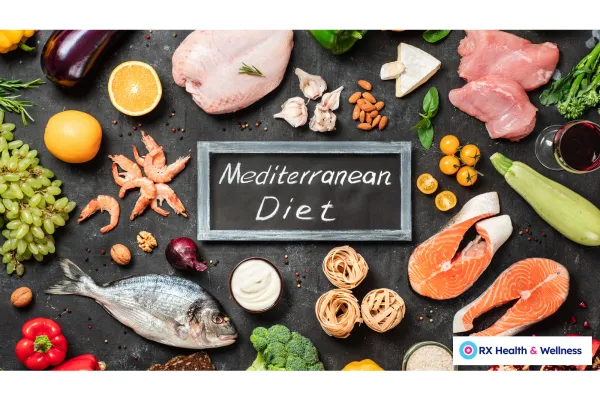
The Mediterranean Diet
The Mediterranean Diet: A Simple and Healthy Way to Eat
The Mediterranean diet is one of the world’s healthiest ways to eat.
It comes from the traditional foods of countries like Greece, Italy, and Spain.
People in these regions tend to live longer and have fewer heart problems.
What Is the Mediterranean Diet?
This isn’t a strict meal plan.
It’s a flexible and balanced way of eating.
It focuses on fresh, whole, and minimally processed foods.
Core Foods Include:
Fruits and vegetables
Whole grains (like oats, barley, and brown rice)
Legumes (like beans, peas, lentils)
Nuts and seeds
Extra virgin olive oil
Fish and seafood (2–3 times a week)
Poultry, eggs, and dairy in moderation
Little red or processed meat
Herbs and spices instead of salt
Water as the main drink
Optional: small amounts of red wine with meals
Why Is It So Good for You?
This eating style supports your heart, brain, and overall health.
🫀 Heart Health
The diet includes healthy fats from olive oil, fish, and nuts.
These fats help lower bad cholesterol and reduce blood pressure.
📖 A large clinical trial found that people following the Mediterranean diet had a 30% lower risk of heart disease.¹
🩸 Diabetes Prevention
Fiber from whole foods helps keep blood sugar steady.
This reduces insulin spikes and supports metabolic health.²
🧠 Brain Health
Studies suggest it may reduce memory loss and the risk of Alzheimer’s disease.³
⚖️ Weight Control
The diet is filling but not restrictive.
You naturally eat fewer calories and stay full longer—without feeling deprived.
Eat More of These
Leafy greens and colorful vegetables
Whole fruits like berries, apples, and citrus
Fatty fish like salmon, mackerel, and sardines
Whole grains (quinoa, brown rice, farro)
Legumes (lentils, beans, chickpeas)
Extra virgin olive oil
Nuts and seeds
Eat Less of These
Sugary drinks (soda, sweetened tea)
Sweets, pastries, and candy
White bread and pasta
Processed foods and frozen meals
Red and processed meats (like bacon or sausage)
Butter and margarine
Tips to Get Started
Add a vegetable or salad to every meal
Use olive oil instead of butter
Replace red meat with fish or beans
Choose whole grains instead of white bread or rice
Season with herbs and spices instead of salt
Final Thoughts
The Mediterranean diet is more than just food.
It’s also about enjoying meals, staying active, and sharing time with others.
It’s simple, delicious, and backed by science.
Whether you’re trying to manage blood sugar, protect your heart, or feel your best—this way of eating works.
References
Estruch R, et al. (2013). Primary prevention of cardiovascular disease with a Mediterranean diet. N Engl J Med; 368:1279–1290.
Martinez-Gonzalez MA, et al. (2010). Mediterranean diet and prevention of chronic diseases. Public Health Nutr.
Sofi F, et al. (2008). Adherence to Mediterranean diet and health status: meta-analysis. BMJ.
